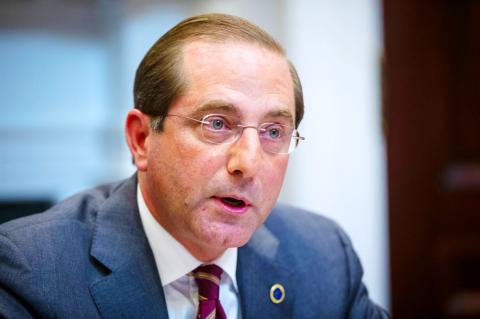US Representative Ted Yoho on Friday sent a letter to US Secretary of Health and Human Services Alex Azar, urging him to visit Taiwan next month to attend an international workshop on public health and advocate for Taiwan’s participation in the upcoming World Health Assembly (WHA).
“I would like to bring to your attention the upcoming Global Cooperation and Training Framework [GCTF] meeting that Taiwan will be hosting from April 30 to May 3, 2019, in Taipei. I urge you to attend this important event,” Yoho said in the letter.
This year’s GCTF event, a joint Taiwan-US program established in 2015, is to be an international workshop on treatment guidelines for drug-resistant tuberculosis, the Ministry of Foreign Affairs said.

Photo: Bloomberg
Through the GCTF, Taiwan and the US have conducted training programs for experts to combat Middle East respiratory syndrome, dengue fever and the Zika virus, Yoho said, urging the US not to undervalue Taiwan’s financial and technical contributions to global health initiatives.
“Since 1996, Taiwan has invested over [US]$6 billion in international medical and humanitarian aid efforts, impacting over 80 countries. In 2014, Taiwan responded to the Ebola crisis by donating [US]$1 million and providing 100,000 sets of personal protective equipment,” the Republican legislator said.
Despite Taiwan’s contributions, it has suffered “unnecessary exclusion” from international bodies that address health initiatives at the behest of China, particularly the WHO, which was why he introduced bill H.R.353 in the US House of Representatives to direct the US secretary of state to develop a strategy for helping Taiwan regain observer status at the WHA, Yoho said.
The bill was passed unanimously by the House on Jan. 22.
“While this bill has received support in Congress, I ask for your help in advocating for Taiwan’s inclusion in the 2019 World Health Assembly meeting,” Yoho said. “Diseases know no borders, and Taiwan’s needless exclusion from global health cooperation increases the dangers presented by global pandemics.”
The next WHA is to take place in Geneva, Switzerland, from May 20 to May 28. Taiwan participated in the WHA as an observer from 2009 to 2016, but has not received an invitation ever since due to pressure from China.
At last year’s WHA, Azar expressed his disappointment at Taiwan’s exclusion, saying that it was difficult to reconcile global concern over cross-border infectious diseases with the exclusion of Taiwan and its 23 million people from the gathering.
The ministry yesterday issued a news release thanking Yoho, the US Congress and the US government for their long-standing efforts to push for Taiwan’s participation at health-related international events.
“We welcome more like-minded nations to join hands with Taiwan in safeguarding the health and security of the entire human race,” the ministry said.

NATIONAL SECURITY THREAT: An official said that Guan Guan’s comments had gone beyond the threshold of free speech, as she advocated for the destruction of the ROC China-born media influencer Guan Guan’s (關關) residency permit has been revoked for repeatedly posting pro-China content that threatens national security, the National Immigration Agency said yesterday. Guan Guan has said many controversial things in her videos posted to Douyin (抖音), including “the red flag will soon be painted all over Taiwan” and “Taiwan is an inseparable part of China,” while expressing hope for expedited “reunification.” The agency received multiple reports alleging that Guan Guan had advocated for armed reunification last year. After investigating, the agency last month issued a notice requiring her to appear and account for her actions. Guan Guan appeared as required,

A strong cold air mass is expected to arrive tonight, bringing a change in weather and a drop in temperature, the Central Weather Administration (CWA) said. The coldest time would be early on Thursday morning, with temperatures in some areas dipping as low as 8°C, it said. Daytime highs yesterday were 22°C to 24°C in northern and eastern Taiwan, and about 25°C to 28°C in the central and southern regions, it said. However, nighttime lows would dip to about 15°C to 16°C in central and northern Taiwan as well as the northeast, and 17°C to 19°C elsewhere, it said. Tropical Storm Nokaen, currently

‘NATO-PLUS’: ‘Our strategic partners in the Indo-Pacific are facing increasing aggression by the Chinese Communist Party,’ US Representative Rob Wittman said The US House of Representatives on Monday released its version of the Consolidated Appropriations Act, which includes US$1.15 billion to support security cooperation with Taiwan. The omnibus act, covering US$1.2 trillion of spending, allocates US$1 billion for the Taiwan Security Cooperation Initiative, as well as US$150 million for the replacement of defense articles and reimbursement of defense services provided to Taiwan. The fund allocations were based on the US National Defense Authorization Act for fiscal 2026 that was passed by the US Congress last month and authorized up to US$1 billion to the US Defense Security Cooperation Agency in support of the

PAPERS, PLEASE: The gang exploited the high value of the passports, selling them at inflated prices to Chinese buyers, who would treat them as ‘invisibility cloaks’ The Yilan District Court has handed four members of a syndicate prison terms ranging from one year and two months to two years and two months for their involvement in a scheme to purchase Taiwanese passports and resell them abroad at a massive markup. A Chinese human smuggling syndicate purchased Taiwanese passports through local criminal networks, exploiting the passports’ visa-free travel privileges to turn a profit of more than 20 times the original price, the court said. Such criminal organizations enable people to impersonate Taiwanese when entering and exiting Taiwan and other countries, undermining social order and the credibility of the nation’s